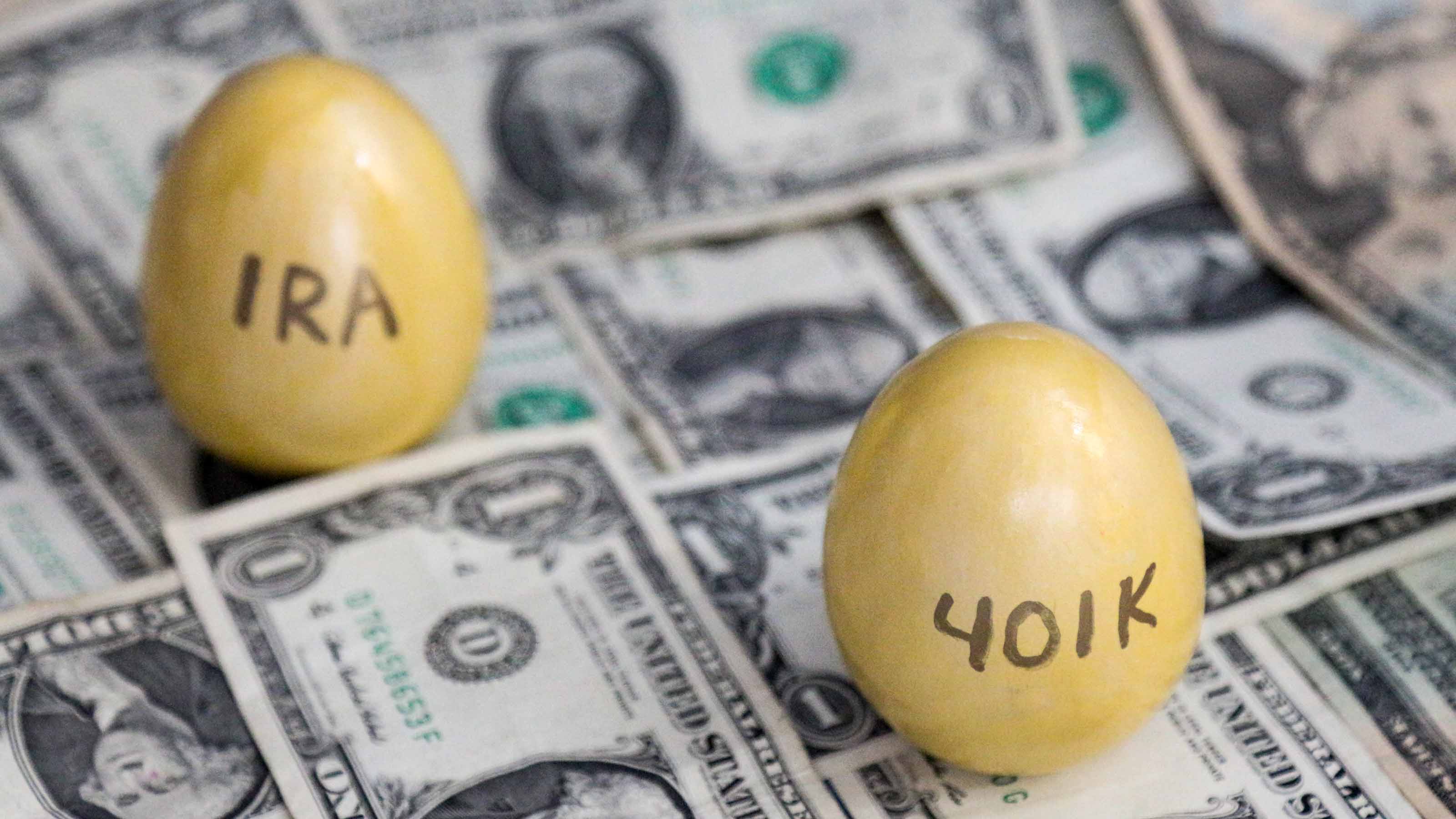Retirement Account Contribution Limits for 2014
Here's how much you can stash in a 401(k), 403(b), 457, traditional IRA and Roth IRA. Plus, 2014 benefits adjustments for retirees.

Profit and prosper with the best of Kiplinger's advice on investing, taxes, retirement, personal finance and much more. Delivered daily. Enter your email in the box and click Sign Me Up.
You are now subscribed
Your newsletter sign-up was successful
Want to add more newsletters?

Delivered daily
Kiplinger Today
Profit and prosper with the best of Kiplinger's advice on investing, taxes, retirement, personal finance and much more delivered daily. Smart money moves start here.

Sent five days a week
Kiplinger A Step Ahead
Get practical help to make better financial decisions in your everyday life, from spending to savings on top deals.

Delivered daily
Kiplinger Closing Bell
Get today's biggest financial and investing headlines delivered to your inbox every day the U.S. stock market is open.

Sent twice a week
Kiplinger Adviser Intel
Financial pros across the country share best practices and fresh tactics to preserve and grow your wealth.

Delivered weekly
Kiplinger Tax Tips
Trim your federal and state tax bills with practical tax-planning and tax-cutting strategies.

Sent twice a week
Kiplinger Retirement Tips
Your twice-a-week guide to planning and enjoying a financially secure and richly rewarding retirement

Sent bimonthly.
Kiplinger Adviser Angle
Insights for advisers, wealth managers and other financial professionals.

Sent twice a week
Kiplinger Investing Weekly
Your twice-a-week roundup of promising stocks, funds, companies and industries you should consider, ones you should avoid, and why.

Sent weekly for six weeks
Kiplinger Invest for Retirement
Your step-by-step six-part series on how to invest for retirement, from devising a successful strategy to exactly which investments to choose.
How much money will I be able to contribute to my 401(k) and IRA in 2014?
The 2014 contribution limits will remain the same as they are for 2013. You can contribute as much as $17,500 to a 401(k), 403(b), 457 or the federal government’s Thrift Savings Plan, plus as much as $5,500 more in catch-up contributions if you’re 50 or older in 2014. And the annual contribution limit for traditional and Roth IRAs remains at $5,500 in 2014, plus as much as $1,000 more if you're 50 or older.
The income limits determining who can contribute to Roth IRAs are increasing very slightly. You can contribute to a Roth IRA in 2014 only if your adjusted gross income is less than $129,000 if single or $191,000 if married filing jointly. (The amount that you can contribute starts to decline -- or phase out -- for singles earning more than $114,000 and couples earning more than $181,000. )
From just $107.88 $24.99 for Kiplinger Personal Finance
Become a smarter, better informed investor. Subscribe from just $107.88 $24.99, plus get up to 4 Special Issues

Sign up for Kiplinger’s Free Newsletters
Profit and prosper with the best of expert advice on investing, taxes, retirement, personal finance and more - straight to your e-mail.
Profit and prosper with the best of expert advice - straight to your e-mail.
The income limit defining who can claim the savers’ tax credit (officially called the Retirement Savings Contribution Credit) is also increasing slightly. To qualify for the credit, your 2014 adjusted gross income must be less than $60,000 for married couples filing jointly, less than $45,000 for heads of household, and less than $30,000 for singles or married individuals filing separately. See Take Advantage of the Retirement Savers’ Tax Credit for more information about the rules.
2014 Benefits Adjustments for Retirees
A few other inflation adjustments were announced recently: Social Security benefits will increase by 1.5% in 2014, boosting the average monthly benefit from $1,259 to $1,294. See 2014 Social Security Changes for details.
Also, Medicare Part B premiums will remain at $104.90 per month for most people in 2014, and the high-income surcharge for Part B and Part D will increase slightly. See Medicare Part B and Part D Premiums for 2014 for more information.
Profit and prosper with the best of Kiplinger's advice on investing, taxes, retirement, personal finance and much more. Delivered daily. Enter your email in the box and click Sign Me Up.

As the "Ask Kim" columnist for Kiplinger's Personal Finance, Lankford receives hundreds of personal finance questions from readers every month. She is the author of Rescue Your Financial Life (McGraw-Hill, 2003), The Insurance Maze: How You Can Save Money on Insurance -- and Still Get the Coverage You Need (Kaplan, 2006), Kiplinger's Ask Kim for Money Smart Solutions (Kaplan, 2007) and The Kiplinger/BBB Personal Finance Guide for Military Families. She is frequently featured as a financial expert on television and radio, including NBC's Today Show, CNN, CNBC and National Public Radio.
-
 Nasdaq Leads a Rocky Risk-On Rally: Stock Market Today
Nasdaq Leads a Rocky Risk-On Rally: Stock Market TodayAnother worrying bout of late-session weakness couldn't take down the main equity indexes on Wednesday.
-
 Quiz: Do You Know How to Avoid the "Medigap Trap?"
Quiz: Do You Know How to Avoid the "Medigap Trap?"Quiz Test your basic knowledge of the "Medigap Trap" in our quick quiz.
-
 5 Top Tax-Efficient Mutual Funds for Smarter Investing
5 Top Tax-Efficient Mutual Funds for Smarter InvestingMutual funds are many things, but "tax-friendly" usually isn't one of them. These are the exceptions.
-
 Catch-Up Contributions to Retirement Accounts Boosted By SECURE Act 2.0
Catch-Up Contributions to Retirement Accounts Boosted By SECURE Act 2.0Americans approaching retirement age can now squirrel away more money in IRAs, 401(k)s, and other retirement accounts.
-
 When RMDs Loom Large, QCDs Offer a Gratifying Tax Break
When RMDs Loom Large, QCDs Offer a Gratifying Tax BreakSend money directly to charity from your traditional IRA, and you won’t owe taxes on the amount you donate. It’s a win-win!
-
 Save More for Retirement in 2023 Thanks to Higher IRA and 401(k) Contribution Limits
Save More for Retirement in 2023 Thanks to Higher IRA and 401(k) Contribution LimitsIf you're saving for retirement, you can contribute a lot more to an IRA, 401(k), or other retirement account in 2023.
-
 Traditional IRA Contribution Limits for 2022
Traditional IRA Contribution Limits for 2022traditional IRA Once again, retirement savers won’t be able to contribute more to traditional IRAs this year, but changes to how they work may be coming.
-
 No Need to Panic: Social Security Is NOT Running Out
No Need to Panic: Social Security Is NOT Running Outsocial security Yes, Social Security is undergoing some changes, including a possible reduction in benefits in the not-too-distant future – but the checks won’t stop coming. Here’s why the program is changing and what to expect.
-
 5 Year-End Moves to Help Retirees Trim Their Tax Bill
5 Year-End Moves to Help Retirees Trim Their Tax Billtaxes The end of the year is a great time to start thinking about next year's tax bill. Here are some strategies on how to reduce what you will owe Uncle Sam.
-
 Trading Options for Your 401(k)
Trading Options for Your 401(k)Employee Benefits About 40% of companies offer self-directed brokerage accounts in their 401(k) plans, giving participants more investing options.
-
 Worried About Higher Taxes in Retirement? Strategize Now.
Worried About Higher Taxes in Retirement? Strategize Now.Tax Breaks With the Tax Cuts and Jobs Act expiring after 2025, it’s a good time to be proactive about taxes. Here are some smart ideas to consider to put a lid on your tax bills in retirement.